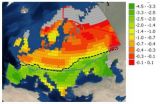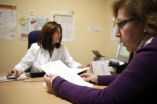Swine flu spread was much wider than first thought, scientists say
The swine flu outbreak of winter 2009-2010 was much more widespread than was previously realized, research suggests
2011-06-09
(Press-News.org) The swine flu outbreak of winter 2009-2010 was much more widespread than was previously realised, research suggests.
Blood samples taken from Scottish adults in March last year at the end of the H1N1 flu season showed that almost half were carrying antibodies to the virus.
Most of the 44 per cent who tested positive had contracted swine flu, although some had acquired immunity from a previous bout of flu, or had been vaccinated.
The research, led by the University of Edinburgh, shows that many cases of swine flu went unreported. Only 100,000 people consulted their GP regarding flu, out of about two million who are believed to have contracted the virus.
People living in the most deprived areas were twice as likely to have contracted the virus. Scientists add that it is possible that many people who were vaccinated against the virus were already immune.
Almost 1600 adults from the east of Scotland and Glasgow, who are participants in the Generation Scotland Scottish Family Health Study voluntary health scheme, took part.
The research, carried out in collaboration with the University of Strathclyde, Health Protection Scotland and West of Scotland Specialist Virology Centre, was funded by the Chief Scientist Office and published in the journal PLoS One.
Professor Mark Woolhouse of the University of Edinburgh's Centre for Infectious Diseases, who led the study, said: "This flu spread very quickly. Fortunately most cases were mild but this also means that they weren't reported. Testing for antibodies to flu could be invaluable in tracking future pandemics and targeting vaccination to those groups who most need it."
INFORMATION: END
ELSE PRESS RELEASES FROM THIS DATE:
2011-06-09
It looks like a credit card…it slips into a wallet or purse…but it could mean the difference between life and death in a medical emergency.
The MyCare Card stores personal medical data (e.g. information on existing medical conditions, allergies and medication being taken) and plugs into a laptop's USB port, enabling the data to be accessed in just a few moments.
It is the first device of its type to have been trialled in the UK.
This working prototype has been developed by City University London and Coventry University, with funding from the Engineering and Physical ...
2011-06-09
The study, published yesterday in the journal Ecology Letters, analyzed the species richness and the structure of their communities throughout the different regions of the European territory from the Ural Mountains to the Iberian Peninsula. The selection of this family of insects was motivated by their high dispersal ability and because their food sources (mainly cattle and sheep dung) are present throughout the continent.
Research by the Spanish National Research Council reveals that the large impacts occurred during the last ice age maintain their
effects on the current ...
2011-06-09
When a person has a family history of cancer, their worry about developing the disease may lead to them refusing to have preventive tests. Advice from genetic counselling units reduces their anxiety but, until now, nobody knew how much. Now, a scientific team has validated the 'Escala de Preocupación por el Cáncer - EPC' (equivalent of the Cancer Worry Scale), the first of its kind in the Spanish language, in order to evaluate it.
"Excessive concern about cancer can result in two kinds of behaviour. Some people undergo excessive and unnecessary diagnostic tests, while ...
2011-06-09
The German National Academy of Sciences Leopoldina has submitted an ad-hoc statement on energy research to Prof. Annette Schavan, the German Federal Minister of Education and Research. Against the backdrop of the events in Fukushima, the statement contains twelve key declarations that mainly address research-policy issues connected to the restructuring of Germany's energy system.
The German National Academy of Sciences Leopoldina compiled the statement, entitled "Energiepolitische und forschungspolitische Empfehlungen nach den Ereignissen in Fukushima" (Energy- and research-policy ...
2011-06-09
PROVIDENCE, R.I. – Researchers from Hasbro Children's Hospital in Providence, R.I., report that medical management may be preferred over surgery for children with orbital cellulitis, an acute infection of the tissues surrounding the eye. They have determined the criteria for surgical intervention should be dependent upon the size of a subperiosteal abscess (SPA). The research is published in the journal Ophthalmic Plastic & Reconstructive Surgery and is now available online in advance of print.
Orbital cellulitis is most often the result of bacteria from a sinus infection, ...
2011-06-09
As millions of acres of farmland in the U.S. Midwest and South recover from Mississippi River flooding, scientists report that river flooding can increase levels of potentially harmful flame retardants in farm soils. But the higher levels apparently do not find their way into the milk produced by cows that graze on these lands, according to a study in the ACS journal Environmental Science & Technology.
Iain Lake and colleagues note that the flame retardants, called PBDEs, are found in a variety of household products including furniture upholstery, textiles, cars, plastics, ...
2011-06-09
Antioxidants are popular anti-aging ingredients in skin creams, and now scientists are reporting a new source of these healthful substances — leaf buds of poplar trees. Their study appears in the ACS' Journal of Agricultural and Food Chemistry.
Xavier Vitrac and colleagues note that there's a long history of using poplar buds to treat various health problems, such as colds, sinusitis, sunburn and arthritis. A substance found in beehives that is made from poplar buds (called propolis) also appears to have similar disease-fighting benefits. Propolis' effects seem to be ...
2011-06-09
Medical scientists now have "clear" evidence that the damaged cartilage tissue in osteoarthritis and other painful joint disorders can be encouraged to regrow and regenerate, and are developing tissue engineering technology that could help millions of patients with those disorders. That's the conclusion of a new analysis of almost 100 scientific studies on the topic, published in ACS's journal Molecular Pharmaceutics.
Tong Cao, Wei Seong Toh and colleagues point out that damage to so-called articular cartilage — the smooth, white, rubbery tissue that covers and cushions ...
2011-06-09
Despite years of scientific studies, reports, lawsuits, congressional inquiries, claims and counterclaims, the question of whether bisphenol A (BPA) poses health threats to people lacks a definitive answer, according to a package of articles on the controversial substance in the current edition of Chemical & Engineering News (C&EN), ACS's weekly newsmagazine.
In the articles, C&EN Senior Correspondent Stephen K. Ritter explains that BPA has been used in an array of consumer goods since the 1950s. Today it is a mainstay ingredient in hard plastics in some reusable drink ...
2011-06-09
COLLEGE PARK, MD (June 8, 2011) -- When the current financial crisis hit, the failure of traditional economic doctrines to provide any sort of early warning shocked not only financial experts worldwide, but also governments and the general public, and we all began to question the effectiveness and validity of those doctrines.
A research team based in Israel decided to investigate what went awry, searching for order in an apparently random system. They report their findings in the American Institute of Physics' journal AIP Advances.
The novelty of their study is the ...
LAST 30 PRESS RELEASES:
[Press-News.org] Swine flu spread was much wider than first thought, scientists say
The swine flu outbreak of winter 2009-2010 was much more widespread than was previously realized, research suggests


